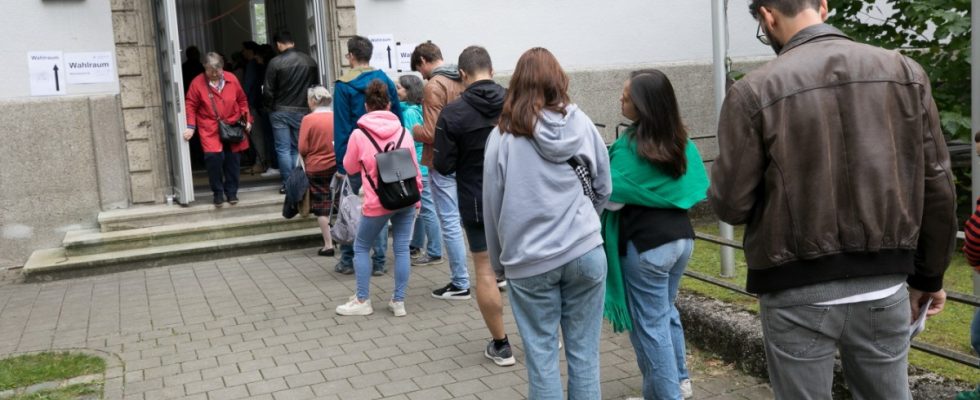Long queues formed in front of several polling stations in Munich on Sunday. Voters report that they waited in line for more than 30 minutes to cast their vote. There were long waiting times at polling stations in Pasing, Sendling, Berg am Laim, Bogenhausen, Schwabing and Westend. In some places the signage was not clear, elsewhere additional voting booths were set up during the election. Some people accuse the district administration department (KVR) of poor organization on platform X (formerly Twitter).
There were already large crowds in some polling stations in the morning, and by 12.30 p.m. 51 percent of Munich residents had already voted – more than five years ago. And this despite the fact that voter turnout at the end of the day was 69.1 percent, lower than in the 2018 state election. At that time, 72.4 percent of those eligible to vote had cast their vote. However, there were also more polling stations back then: there were 712 in the 2018 state election and 506 this Sunday. One reason for the smaller number of polling stations: In this election, a particularly large number of people requested postal voting documents; according to the provisional final result, the postal voting rate is 54 percent.
When asked whether the KVR was surprised by the rush of voters, a spokeswoman for the authority answered in the negative. It is “completely normal” that there are longer waiting times at certain peak times, for example after breakfast. “The KVR has no information that there were longer waiting times in this state election than in the last election in 2018.” If queues formed, more voting booths were set up. “We were prepared for exactly this scenario,” said a spokeswoman.
In some places in the city, several polling stations were housed in one building or even in just one room. This procedure of setting up several voting rooms at one location is also common, according to the KVR. The reason: There are not as many suitable and available locations as you want.
So no problem at all from the KVR’s point of view. In a press release on Monday, Hanna Sammüller-Gradl, district administration officer and constituency manager, praised the extraordinary commitment of the KVR employees and the 10,246 election workers. They counted the ballot papers of 628,645 Munich voters. “Yesterday’s election was preceded by months of planning,” said Sammüller-Gradl. “Thanks to the excellent preparation of the electoral office, the Munich Marathon did not hinder the smooth running.”
Around 6,800 people had to cross streets that were closed because of the marathon. Stewards were there to help, there were litter sheets, notices and a social media campaign, the KVR said. There were no questions or reports of problems on election day.
Voters were able to cross the marathon route in several places.
(Photo: Florian Peljak)
On Sunday, election workers in the Event and Order Center (MOC) at Messe München will prepare to count the postal voting documents.
(Photo: Sven Hoppe/dpa)
And the KVR spokeswoman also contradicts the impression of some observers that the counting of Munich’s votes took longer than usual this time: The first election results from Munich were made available from 8 p.m., and the preliminary results were in seven of the nine Munich voting districts submitted to the state returning officer significantly earlier than in the previous state elections.
When asked whether the KVR would like to do anything differently in the coming elections, a spokeswoman replied: “As is usual with every election, this one will also be evaluated and, if necessary, optimization options identified.” There doesn’t seem to be any particular need for this at the KVR.

